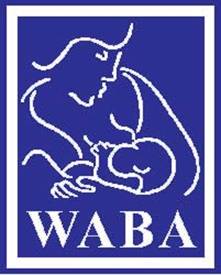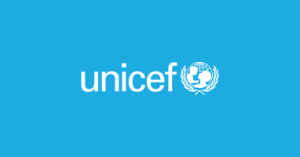And increasingly, it is clear that breastfeeding is not only the cornerstone of a child’s healthy development; it is also the foundation of a country’s development.
World Breastfeeding Week 2016 Message, from UNICEF Executive Director Anthony Lake, and WHO Director General Margaret Chan.
Breastfeeding: A Key to Sustainable Development
There is a reason why virtually every country around the world observes World Breastfeeding Week every year: Breastfeeding is one of the most effective — and cost-effective — ways to save and improve the lives of children everywhere, yielding lifelong health benefits for infants and their mothers.
And increasingly, it is clear that breastfeeding is not only the cornerstone of a child’s healthy development; it is also the foundation of a country’s development. In fact, supporting breastfeeding is one of the smartest investments countries can make in the wellbeing of their citizens — and thus, in their own long-term strength. In low-, middle- and high-income countries alike, the benefits for individuals, families and societies include ending preventable child deaths, improving maternal and child health, boosting educational attainment, and increasing productivity.
These are some of the conclusions of the recent series on breastfeeding in The Lancet, which argues that improving breastfeeding practices makes the world healthier, smarter, and more equal. 1 The series — and much well-established evidence — underscore the links between investing in breastfeeding and achieving the Sustainable Development Goals (SDGs), the universal global goals adopted by world leaders in 2015 that aim to end poverty, fight inequality and tackle climate change by 2030.
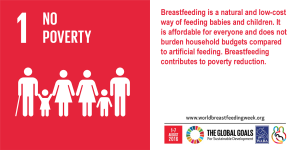 For example, breastfeeding is a critical key in achieving SDG 2 and SDG3 — which include ending hunger, improving nutrition and promoting health and wellbeing.
For example, breastfeeding is a critical key in achieving SDG 2 and SDG3 — which include ending hunger, improving nutrition and promoting health and wellbeing.
Breastfeeding is one of the keys to reducing under-five mortality. Increasing rates of breastfeeding to target levels could save the lives of 820,000 children under 5 — 87 percent of them infants 6 months old and younger — every year. This represents around 13 percent of all under-five child deaths annually.
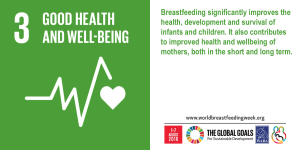 Breastfeeding also improves long-term health, decreasing the risk of non-communicable diseases, including childhood asthma and obesity. It can reduce the chance of diabetes and heart disease later in life. And longer duration of breastfeeding protects maternal health, helping reduce the risk of breast and ovarian cancers.
Breastfeeding also improves long-term health, decreasing the risk of non-communicable diseases, including childhood asthma and obesity. It can reduce the chance of diabetes and heart disease later in life. And longer duration of breastfeeding protects maternal health, helping reduce the risk of breast and ovarian cancers.
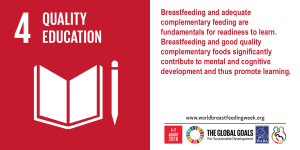 Breastfeeding also can help drive the achievement of SDG4, which includes inclusive education and lifelong learning. Significantly, this goal also sets a target for early childhood development,
Breastfeeding also can help drive the achievement of SDG4, which includes inclusive education and lifelong learning. Significantly, this goal also sets a target for early childhood development,
identifying it as a crucial path to all sustainable development. Breastfeeding is an essential part of a healthy early childhood — supporting both physical and cognitive development. It is associated with higher cognitive ability, increased I.Q. scores and better learning and literacy outcomes — all of which can translate into increased productivity and earnings later in life.
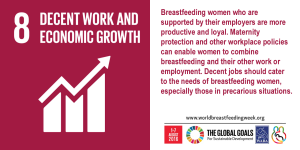 These improved outcomes in health and learning in turn support the achievement of other goals — including SDG 1, 8 and 10, which concern ending poverty, promoting economic growth
These improved outcomes in health and learning in turn support the achievement of other goals — including SDG 1, 8 and 10, which concern ending poverty, promoting economic growth
and reducing inequalities. Breastfeeding is a cost-effective way to increase human capital and stimulate economic growth. Globally, the cost of lower cognitive ability associated with lack of
breastfeeding amounts to about US$300 billion annually, representing 0.49 percent of global gross national incomes. The health benefits associated with optimal breastfeeding could save
billions of dollars in healthcare costs each year by greatly reducing hospital admissions for infectious diseases.
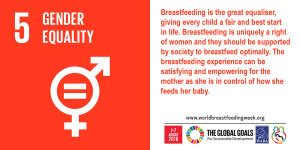 And breastfeeding can also play a roll in achieving gender equality, the central focus of SDG5. For example, exclusive breastfeeding can promote birth-spacing — enabling women to delay
And breastfeeding can also play a roll in achieving gender equality, the central focus of SDG5. For example, exclusive breastfeeding can promote birth-spacing — enabling women to delay
subsequent pregnancy and empowering them to exercise greater reproductive autonomy, especially in countries and communities where women have limited access to quality contraceptive information and care. In turn, this can increase the ability of women and girls to return to school, and to work outside the home and better support their families.
The evidence that breastfeeding benefits women, children, as well as communities and societies, has never been stronger — but breastfeeding rates have remained stagnant for the
last 20 years. Too many children are missing out on this tremendous boost to their health and wellbeing. Too many women are not receiving the information and support they need to
breastfeed successfully.
We can make faster progress toward all our development goals by better promoting, protecting and supporting breastfeeding. Now, as governments around the world develop budgets and
action plans to achieve the Sustainable Development Goals, breastfeeding must be a policy, programming, and public spending priority. For only greater political commitment matched
with practical action can make breastfeeding a part of every child’s healthy start in life, and every society’s healthier, more equitable — and thus, more sustainable – future.
Read the full message : wbw2016 UNICEF Letter of support
